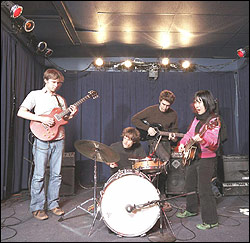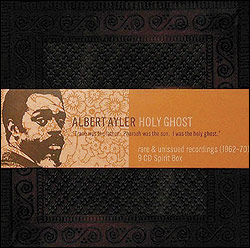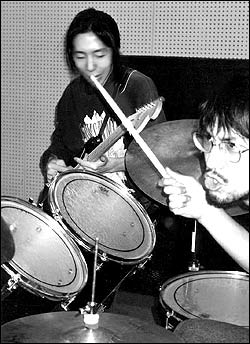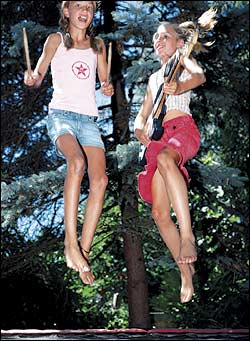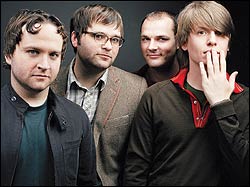“I’m anything in the world but a record collector,” says Deerhoof drummer Greg Saunier. “I hardly have any. But my one weakness is when rock bands or jazz musicians play classical pieces: Switched-On Bach, the Swingle Singers. . . .” He goes on to mention a third artist (his name rhymes with Cycle Molton) who will go unnamed here, since singer/bassist Satomi Matsuzaki has threatened to quit the band if Saunier discusses his love for said mulleted crooner’s classical crossover album again.
That fascination with translating music from one idiom to another has a lot to do with the relationship between the San Francisco band’s recordings and live performances. On record, Deerhoof’s mood swings are wide and fast; it’s pretty clear that at least one of the band members has a background in 20th-century composition (that would be Saunier), and that at least one of them was deeply imprinted by the Who’s Meaty Beaty Big & Bouncy. The instrumental parts of their seven studio albums and their new, Japan-only Green Cosmos EP are as dynamically binarized as they can manage—subtle and restrained or maniacally flailing, tenderly chiming or blistering with distortion, with very little middle ground—and Matsuzaki’s singing (in multiple languages) is absolutely cool and affectless, like a clear-lined cartoon drawn against a violently impressionistic background. Saunier once explained it as being not like a child’s voice but like the voice of someone talking to a child, which is about right.
On stage, though, their records’ studio constructions turn into unipolar, full-on rock—Saunier’s drumming is one long, continuous seizure, guitarists John Dieterich and Chris Cohen rear and slam, and the songs’ rhythms wriggle like a beast being dragged out of its hole. The compositions that seem to be fixed in place on the recordings become a lot more open, too. “None of us ever know what our bandmates are suddenly going to come up with,” Saunier says. “For me, the most fun moments are those places where we know the next section of a song is coming up, but we don’t exactly know how we’re going to get there.”
They’ve documented that even weirder, looser side of Deerhoof on a couple of live albums—2001’s Koalamagic (Dual Plover) and last year’s live-on-the-radio retrospective, Bibidi Babidi Boo, which was available as a free MP3 download from deerhoof.killrockstars.com for a few months (it’s still floating around various file-sharing networks). The band’s very big on making its music available for free on the Web: The “Puzzling Music Archive” currently features several dozen high- quality Deerhoof MP3s, as well as music from bands in their family tree like Curtains and 7 Year Rabbit Cycle.
Saunier explains: “We’ve always had free music on our site or linked to it, and it’s completely made the difference when we’ve traveled to a new place for the first time. One of the things that’s really neat about being in Deerhoof is the opportunity to travel. We just played Ladyfest Honolulu in Hawaii, and so many people we met over there repeated this refrain of ‘no bands ever come here’—they’re starved for music from the outside. Even record stores in Hawaii are kind of conservative in what they carry, so people have to go to the Internet to discover new things.”
Their current tour will bring them to the Paradox in Seattle on April 16, and this time they’re doing something unusual for them: rehearsing. “We didn’t even have a practice space for the two years leading up to the last two albums,” Saunier says. “We’d go to Chris’ parents’ house a few days before each tour to try to figure out some of the songs we’d already put on the CD but hadn’t actually learned to play. This time, we actually got a space at the beginning of the year, and we’ve been going in every day—it’s a totally different thing. It’s been exciting for us.”
Unfortunately, it appears that Green Cosmos won’t be out in the U.S. by the time they hit the road. Originally commissioned by the band’s Japanese label, it’s the first recording on which Matsuzaki has sung entirely in Japanese (well, almost—the title phrase of “Come See the Duck” appears in English, not that it parses much more clearly to an English speaker). According to Saunier, “Satomi was interested in seeing how our music would differ if she was thinking of her audience as being people from the country she came from, and how that would change the way she’d write her lyrics. We tried to dress it up and make it very orchestral—it’s as far away from the way we play live as we’ve ever tried to do before.”
Green Cosmos is definitely a departure for Deerhoof, especially its centerpiece, a long new-wave dance track called “Spiral Golden Town,” which features a Middle Eastern–sounding string section. Elsewhere, there are horns, marimbas, and samba drumming, as well as Deerhoof’s usual enormous hard-rock swaggering and shy little tunes; it’s anybody’s guess how these songs will come out live. That’s fine with the band. “We’ve never wanted to even be clear on what kind of music we were playing,” Saunier says. “Even at any one time, it’s uncertain whether we mean something very silly or something very serious.”
Deerhoof play the Paradox Theater with Why?, Warbler, and Le Ton Mite at 8 p.m. Sat., April 16. $10. All ages.
